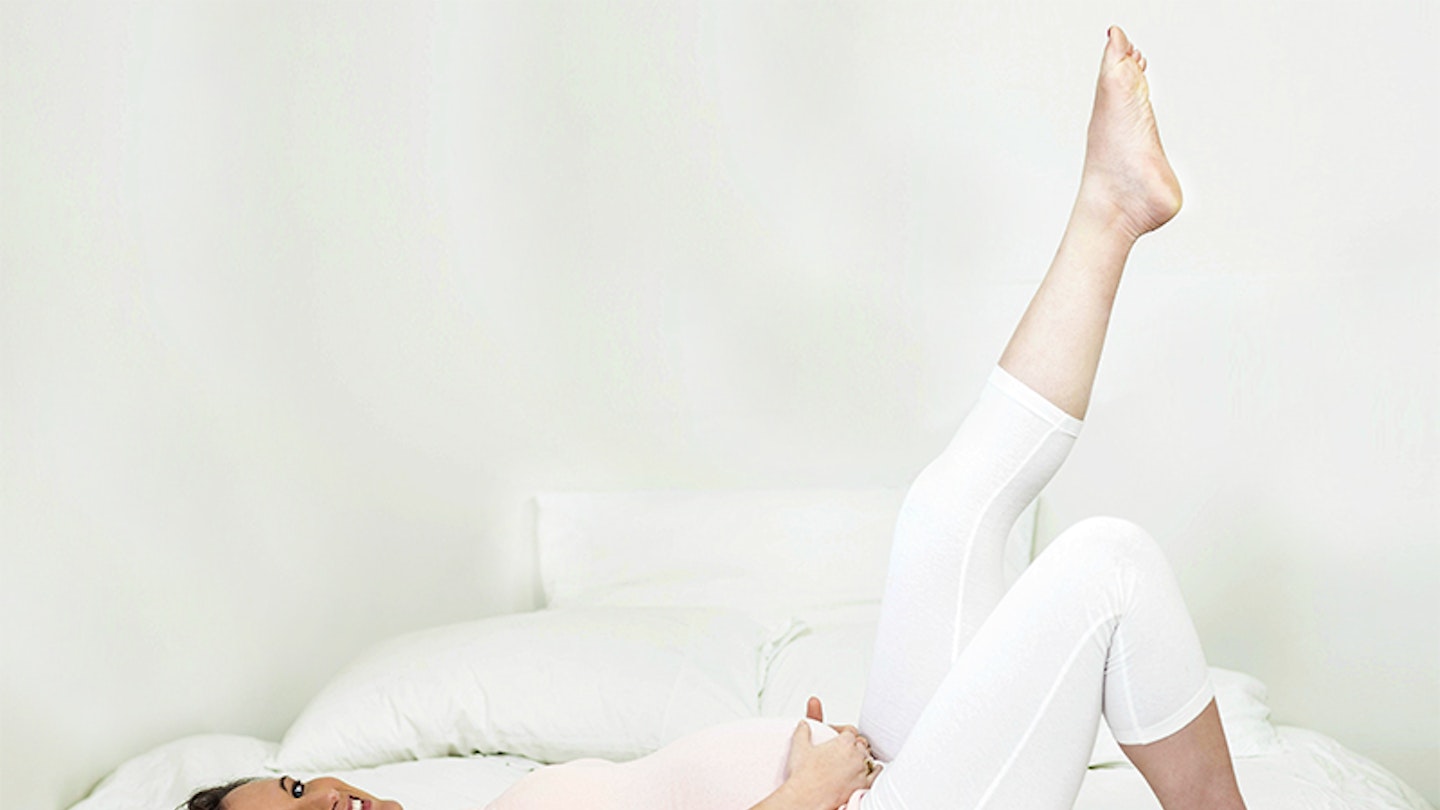Are you suffering with pregnancy leg cramps or restless legs? Follow our expert advice to get rid of those leg cramps for good and sleep better.
There’s nothing subtle about an attack of pregnancy cramp. ‘The spasms tend to strike at night and usually affect the lower limbs, so when you’re pregnant, it’s not always easy to leap out of bed and get into a position that gives relief,’ says Tina.
Pregnancy leg cramps most often begin in the second trimester, at around 18-20 weeks, and continue to occur until birth. The uncomfortable sensation as the muscle contracts is more usually associated with a build-up of lactic acid during exercise, but no one knows why they’re so common in pregnancy.
What causes pregnancy leg cramps?
‘There are all sorts of theories about causes of pregnancy leg cramps, but no hard evidence,’ explains Tina. ‘One theory is that your uterus becomes heavier as your baby grows, which means that your legs are working harder to carry you. Another possible cause is that the uterus lying on the major vein that returns blood to the heart slows that process, leading to heavy, sluggish limbs that are more prone to cramp.
‘The problem seems to be linked to a degree of dehydration and a change in mineral levels,’ Tina adds. ‘Your body will prioritise the development of your baby during these second and third trimesters. This can lead to a lack of calcium, magnesium or potassium, which could be a trigger factor for cramp.’
How to ease pregnancy leg cramps
Drinking plenty of water is an easy fix for pregnancy leg cramps, and there are simple steps you can take to top up those essential minerals too.
‘Guarding against deficiencies through a varied diet is the best way,’ advises Tina. ‘Bananas are particularly rich in magnesium and potassium, and many pregnant women find that their cramps disappear if they eat plenty of them. Leafy green veg are another good source of magnesium, while potassium is also found in potatoes, sweet potatoes and milk. Increase your calcium levels with plenty of cheese, leafy vegetables, nuts and fish.’
A lack of exercise may also contribute to cramp. ‘Walking can help guard against it, as the gentle stretching of your calf muscles prevents the build-up of lactic acid and helps the blood be pumped out of your legs and back to your heart,’ says Tina.
‘Pregnancy yoga can also help, as stretching improves blood flow around the body. And try some simple stretches before bed too, such as moving your ankles up and down and from side to side.’
If you’re gripped with pregnancy leg cramps, there’s only one thing to do. ‘Stand on a flat surface, ideally a cold floor,’ explains Tina. ‘With your muscles cramping, your foot won’t want to flatten and you might have to push it down with your hand, but the pain will start to recede as soon as your sole touches the floor. If your bump is too big for you to manage this, delegate the job to your partner or, if you can’t get out of bed, get them to push against your foot instead.’
Five ways to beat pregnancy leg cramps
1). Gentle compression will boost blood flow, lessening the risk of cramp. Preggers Footless Maternity Support Tights from Therafirm, £23.60, pebbleuk.com, offer stylish, lightweight, graduated support.
2). Make ice-cream by freezing magnesium-rich banana chunks with fresh raspberries, then blitzing them in a food processor with a splash of almond milk and a knob of almond butter. Sprinkle toasted pumpkin seeds on top for a further boost of this cramp-busting mineral.
3). A foot massage before bed stimulates blood circulation in your lower limbs.
4). Crossing your legs or tucking your ankles underneath you as you relax on the sofa in the evenings slows the return of blood to your heart. Keep your legs in front of you and elevate them slightly on a low stool.
5). Night-time bouts of cramp can be triggered when you inadvertently point your toes during sleep, shortening your calf muscles. Put a soft pillow at the end of the bed to prevent this. Using a pregnancy pillow while you sleep may also help.
Best maternity support tights for comfort
 Amazon
Amazon www.pebbleuk.com
These amazing maternity support tights have a lightweight and a great waistband to promote better blood flow to energise tired, slow feeling legs, and to help prevent and stop swelling from water retention.
Pros
- Comes in S, M, L and tall
- These opaque, footless maternity support tights are great for any modern mum-to-be
Cons
- Not many colours to choose from
See your doctor about pregnancy leg cramps if…
Cramps cause deep, lingering pain with accompanying redness, swelling or heat, or if the area feels warm to the touch.
Cramps are severe and persistent: If the leg cramps are extremely painful, frequent, and do not improve with typical self-care measures like stretching or hydration, it could be a sign of an underlying issue.
You notice swelling and redness: If the cramp is accompanied by swelling, redness, warmth, or tenderness in the leg, it could indicate a blood clot or deep vein thrombosis (DVT), which requires immediate medical attention.
You experience changes in movement or function: If the cramps are affecting your ability to walk or function normally, or if there is significant weakness in the legs, you should see your doctor.
You have other symptoms: If the cramps are accompanied by other concerning symptoms such as shortness of breath, chest pain, or a rapid heartbeat, seek medical advice immediately.
Meet the expert
Tina Perridge is a founder of the independent service Neighbourhood Midwives at (neighbourhoodmidwives.org)
Samantha Ball is a Commercial Content Writer and freelanced for the Mother&Baby website for two years before joining the team full-time. She's a mum of two and loves browsing for the best products and cute outfits.
